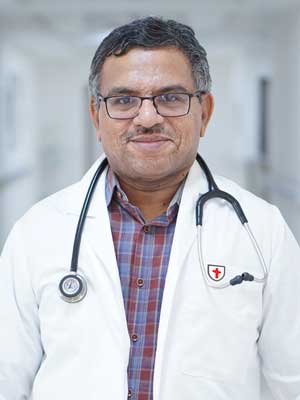Overview
The Gastrointestinal & Hepatobiliary Surgery department at BCMCH is committed to achieving the best results for each and every person under its care. Along with surgical skills, we believe compassion and empathy to be of equal importance. Surgery and hospital stay can be daunting, but our team aims to provide comfort holistically.
The department is supported by the best hospital infrastructure in the region, including Class I modular operation theaters, state-of-the-art sterilization systems such as Plasma Sterilization, advanced energy devices like Harmonic Scalpel and Ligasure, operating microscopes, as well as the latest generation laparoscopic equipment. Our goal is to provide cutting-edge surgical care while ensuring a compassionate and supportive environment for our patients.
We perform a comprehensive range of gastrointestinal and hepatobiliary surgery procedures. Our expertise includes both laparoscopic and open surgeries, ensuring that we can offer the most suitable and effective treatment options for each individual patient. The decision regarding the best modality of treatment is taken after a Multidisciplinary Tumour Board meeting, which includes the medical and radiation oncologist, gastrointestinal surgeon, and radiologists. Surgical excellence in the 21st century depends on a combination of experienced surgeons, well-trained healthcare personnel, adherence to international standards of treatment, advanced technology, and a humane approach. At our department, we aspire to provide all these factors to every patient.
Services
Laparoscopic Procedures :
-
Cholecystectomy
-
Appendicectomy
-
Inguinal hernia repair
-
Ventral and incisional hernia repair
-
Hemicolectomy
-
CBD exploration
-
Pancreatectomy
-
Bowel perforation repair
-
Hiatus hernia repair
-
Gastrectomy
-
Anterior resection
Advanced Laparoscopic and Hybrid Procedures :
-
Video Assisted Thoracic Surgery (VATS)
-
Bariatric Surgery for weight loss
-
Single Incision Laparoscopic Surgery (SILS)
-
Combined cholecystectomy plus ERCP
-
Intraoperative Enteroscopy
-
Laparoscopic Oesophagectomy
-
Laparoscopic Colectomy
-
Laparoscopic Interior Resection
-
Fundoplication
-
TAMIS (Transanal minimally invasive surgery for rectal tumours)
-
Complex liver/pancreatic cyst
-
Diagnostic laparoscopy
-
Laparoscopic management of GERD( gastroesophageal reflux disease)
-
VARD- video assisted management of necrotising pancreatitis
-
Rectal prolapse - laparoscopic rectopexy
-
Choledochal cyst laparoscopic excision
Open Surgical Procedures:
-
Radical gastrectomy
-
Whipple’s surgery
-
Hepaticojejunostomy
-
Major liver resections
-
Small and large bowel resections
-
Splenectomy
-
Abdominoperineal resection
-
Oesophagectomy
-
Surgery for fistula in ano, Hemorrhoids, Fissure
Cancer Treatment :
-
Treatment of cancers of the gastrointestinal system, including liver and pancreas
-
Both open and laparoscopic procedures are regularly performed
-
High volume centre for surgery for colon and rectal cancer
Specialists
FAQ
Liver transplant is usually reserved as a treatment option for people who have significant complications due to end-stage chronic liver disease. Liver transplant may also be a treatment option in rare cases of sudden failure of a previously healthy liver.
Often, lifestyle modifications can be used to treat issues that arise within the GI tract while medicine can be used to effectively treat more severe conditions and disorders. However, for some people, surgery is necessary.
Some disorders that GI surgery treats include:
-
Colon cancer
-
Esophageal disorders
-
Hepatobiliary disorders
-
Inflammatory bowel disease
-
Liver disease
-
Obesity
-
Pancreatic Cancer
Those who suffer from severe conditions that impair the body’s processing of food and waste may be considered for surgery. Gastrointestinal procedures may also be an option for those whose weight has put them at risk for other diseases such as hypertension or diabetes.
For outpatient surgeries, such as routine hernia repair surgery, you can usually expect to go home within hours after your surgery. For major GI surgeries, such as esophagus, liver or pancreas resection surgery, you can expect to recover in the hospital for a few days up to one week after surgery. It may take two to three months after a major GI surgery for you to feel like yourself again.



